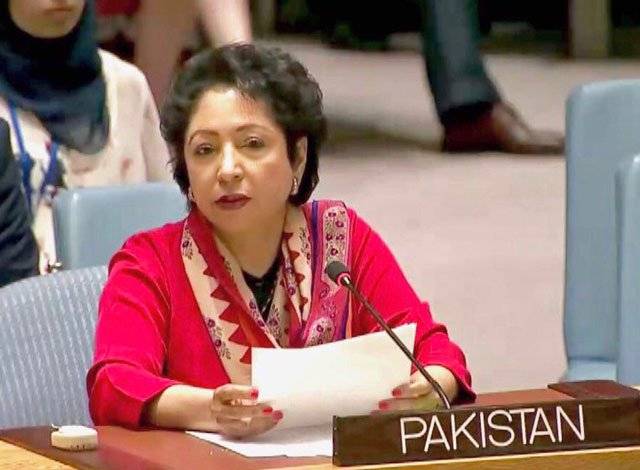UNITED NATIONS: Reaffirming its support to the Palestinians’ cause, Pakistan has told the UN Security Council that international peace and stability cannot be promoted by denying freedom and justice to peoples living under foreign or alien occupation.
Peace in the Middle East could only be built on the foundations of a two-State solution, Ambassador Maleeha Lodhi, Pakistan’s permanent representative to the UN, said, warning that one-State “illusion” would provide neither peace nor security.
Speaking in a debate on the Middle East situation on Thursday, she put the spotlight on plight of Palestinians, saying no other people have suffered greater injustice in recent times.
“During the past seventy years, they have been driven from their homes and their homeland, militarily occupied and obliged to live in conditions resembling apartheid,she said.
Condemning Israel’s cruel occupation and repression during the ˜Great March of Return” in Gaza, the Pakistani envoy said that a peaceful protest was transformed into a callous killing zone by the occupying power, even as the world watched the wanton shooting of unarmed Palestinians on their television.
Ambassador Lodhi recalled that in Gaza Strip, 35 Palestinians, including children as old as 14, had died while “this Council could not even call for an independent and transparent investigation into the incidents.”
“The Palestinian demand for justice was met, once again, by arrogant dismissal,” she told the 15-member Council.
Ambassador Lodhi said that instability in the Middle East was the result of big power politics and divergent interests of regional states that has led to suffering for millions of people in the region.
“Big power rivalries, combined with the divergent policies and interests of major regional states, presage a period of continued conflict and instability in the region, prolonged suffering for the millions of innocent victims of the regional conflicts and a rising danger of a major international conflagration.”
Warning that the region stood at a “dangerous crossroads, she said that the seething fires of conflict and violence threaten to exacerbate the multiple intersecting and overlapping regional fault-lines, thus presenting a greater risk to international peace and security than ever before.
Ambassador Lodhi urged the Security Council to analyze the reasons for the region’s “troubles, as some characterize the Middle East as a “troubled” place. Most of these troubles, she stressed, are a direct consequence of foreign occupation, annexation and intervention.
Condemning Israel’s “cruel occupation and repression during the “Great March of Return” in Gaza, Pakistani envoy said that a peaceful protest was transformed into a callous killing zone by the occupying power, even as the world watched the wanton shooting of unarmed Palestinians on their television screens.
Expressing grave concern about reports of the alleged use of chemical weapons in Syria, Ambassador Lodhi condemned any use of chemical weapons by anyone, anywhere. “It is abhorrent and illegal and deserves unreserved condemnation, she added.
Ambassador Lodhi welcomed the deployment of the Organization for the Prohibition of Chemical Weapons (OPCW) Fact Finding Mission to Syria, and expressed confidence that its investigations would assist in establishing the facts.
“At the same time, we reiterate our call on all sides to refrain from actions that are incompatible with the Charter of the United Nations and international law”.
She concluded by cautioning that unless the value of human life and the rights of all peoples are respected; and unless the principles of the UN Charter are upheld, the Middle East – and other regions, near and far- may well be racing towards unprecedented disaster.
Opening the debate, the United Nations Special Coordinator for the Middle East Peace Process, Nickolay Mladenov, said that outside interference and growing risks of potentially explosive miscalculations, from Gaza to Syria to Yemen, everyone in the region must “step away from the brink.
“What happens in the Middle East today has immediate implications for the rest of the world, he said, while cautioning that a general lack of progress should worry everyone.
“The fires of the Middle East continue to expand and shift, and the Israeli,Palestinian conflict remains a perpetual source of oxygen for militants and radicals across the Middle East.






